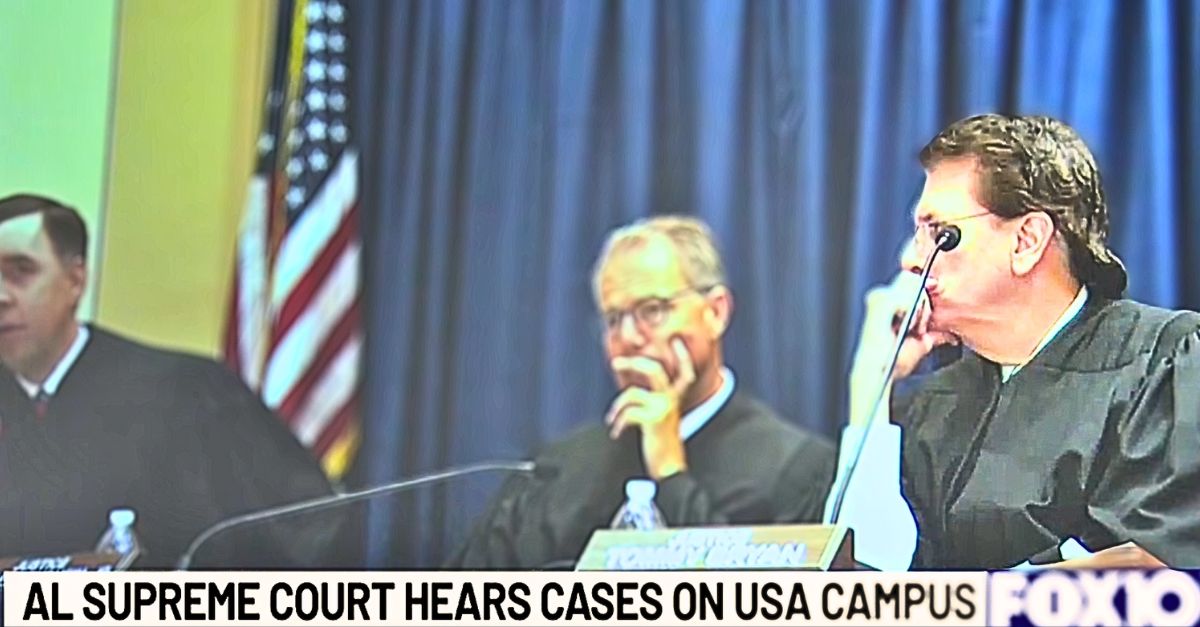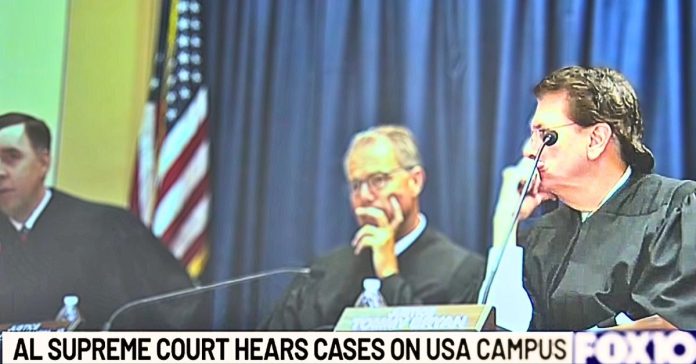
The Alabama Supreme Court decided Friday that embryos in a fertility clinic are minor children for purposes of a wrongful death lawsuit.
(Screengrab via YouTube, WALA)
Alabama’s conservative-leaning Supreme Court decided Friday that frozen embryos in a lab count as “minor children,” and that the embryos’ “parents” can bring a wrongful death claim against a clinic after the embryos were accidentally dropped on the floor.
The unprecedented ruling pushes Alabama — a state that has already announced an intention to criminally prosecute women who terminate pregnancies with abortion pills — even deeper into a conservative legal agenda.
The underlying lawsuit began when three couples — James LePage and Emily LePage, William Tripp Fonde and Caroline Fonde, and Felicia Burdick-Aysenne and Scott Aysenne — sued the Center for Reproductive Medicine for negligence and wrongful death alleging that a fertility clinic in Mobile negligently allowed a patient to wander into the embryology lab, pick up five fertilized embryos, then drop those embryos rendering them unusable for the in vitro fertilization (IVF) process.
In their court filings, the plaintiffs referred to themselves as the “Parents” of their respective embryos and argued that the Alabama constitution guarantees equal protection to those embryos as “unborn children.” A trial judge dismissed their lawsuit in 2022 after finding that the state’s wrongful death statute did not allow individuals to recover for the loss of frozen embryos.
However, in a ruling Friday, the Alabama Supreme Court reversed that decision, agreed with the plaintiffs, and declared that frozen embryos are, in fact, children. The plaintiffs are now permitted to proceed with their legal theory that dropping fertilized embryos amounts to causing wrongful death as the case moves toward trial. Throughout the 25-page ruling for the majority, Justice Jay Mitchell referred to the frozen embryos as “extrauterine children” and “unborn children who are located outside of a biological uterus at the time they are killed,” and said that the state’s wrongful death law applies to “to all unborn children, regardless of their location.”
Mitchell appeared to arrive easily at the conclusion that the statute was intended to apply to frozen embryos. He noted that the parties and “all members of this Court” agree that an “unborn child is a genetically unique human being whose life begins at fertilization and ends at death,” and that “everyone acknowledges” the same to be true of how the terms are used in “ordinary conversation.”
The only question remaining, Mitchell said, was whether there was some unwritten exception to be applied when the unborn children “are not located … inside a biological uterus … at the time they are killed.” Any ambiguity in statutory language must be resolved “in favor of protecting unborn life,” said the justice.
Mitchell wrote that the state’s Wrongful Death of a Minor Act is “sweeping and unqualified” and applies to “all children, born and unborn, without limitation.”
“It is not the role of this Court to craft a new limitation based on our own view of what is or is not wise public policy. That is especially true where, as here, the People of this State have adopted a Constitutional amendment directly aimed at stopping courts from excluding ‘unborn life’ from legal protection,” he reasoned.
Because the court was unwilling to create what it called “a new limitation” on the application of Alabama’s wrongful death statute, the majority concluded that the law must authorize plaintiffs to make claims for the loss of “minor children” who were frozen embryos in a lab.
Chief Justice Tom Parker penned a “special concurrence” in which he leaned heavily on religion. Parker said that the Alabama Constitution specifically recognized that “human life is an endowment from God,” and that the underlying principle that “human life is fundamentally distinct from other forms of life and cannot be taken intentionally without justification” has roots reaching back to “the creation of man in the image of God.”
Parker quoted extensively from scripture as he reasoned that Alabama’s religion-based view supports the court’s decision to allow the plaintiffs to hold the clinic legally responsible. In a passage that was worded more like a theology text than a judicial opinion, Parker wrote:
In summary, the theologically based view of the sanctity of life adopted by the People of Alabama encompasses the following: (1) God made every person in His image; (2) each person therefore has a value that far exceeds the ability of human beings to calculate; and (3) human life cannot be wrongfully destroyed without incurring the wrath of a holy God, who views the destruction of His image as an affront to Himself. Section 36.06 recognizes that this is true of unborn human life no less than it is of all other human life — that even before birth, all human beings bear the image of God, and their lives cannot be destroyed without effacing his glory.
Parker concluded his concurrence by saying that creating an exception to the statute “for the people in this case, small as they were,” would be unacceptable to Alabamians, who have “required” the court “to treat every human being in accordance with the fear of a holy God who made them in His image.”
Justice Greg Cook penned the only dissent and chastised the majority for exceeding their role as judges.
“Statutes Do Not Evolve,” Cook stated simply. “The Legislature Amends Them.”
Cook said it was not the court’s role to update laws that have become “stale” or “shelfworn,” but the legislature’s responsibility to change laws as needed.
Cook also reminded the majority that no court anywhere in the country and no state apart from Alabama has legally recognized frozen embryos as “minor children.”
The justice also provided something of a primer on statutory interpretation. Based on the writings of the late conservative Supreme Court Justice Antonin Scalia and leading legal scholar Bryan A. Garner, courts must interpret the words in a statute in the way ” a reasonable reader, fully competent in the language, would have understood the text at the time it was issued.”
Accordingly, Cook said, the interpretation of “minor child” should be what the common law indicated in 1872 when the original Wrongful Death Act was passed.
“There is no doubt that the common law did not consider an unborn infant to be a child capable of being killed for the purpose of civil liability,” wrote Cook, noting that even 100 years later, case law still did not allow “minor child” to mean “unborn infant,” “much less a frozen embryo.”
Cook ended his lengthy dissent with a lament over the practical consequences of the majority’s decision.
Thanks to the holding, “the creation of frozen embryos will end in Alabama,” predicted Cook, explaining that “no rational medical provider” would continue to create or maintain frozen embryos knowing the risk of wrongful death liability for an accident. As a result, Cook said, “there are many Alabama citizens praying to be parents who will no longer have that opportunity.”
“And, there is no doubt that there will be fewer babies born,” Cook concluded.
Have a tip we should know? [email protected]

